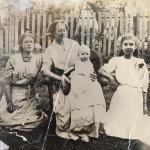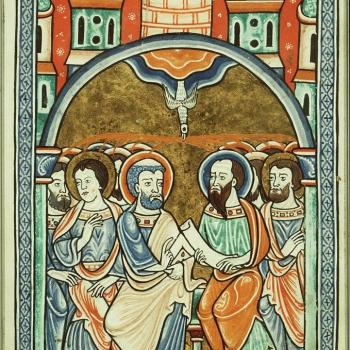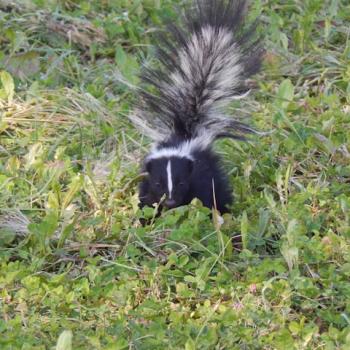I stood at the door experiencing the cacophony that characterizes the sum total of my parents’ family. Voices in varying levels of expression crossed the yard, shrieks of laughter rose from the pool.
“Who are these children’s parents?” I laughingly shouted. It’s a phrase I use often to remind myself that I am not.
I sat down near my sister, juggling writhing twenty-five-month-old limbs and attempting the containment of her disgruntled fourteen-month-old. I didn’t take one of the girls from her even though I could have, consciously applauding my sister for having everything under control and unconsciously bowing to my unspoken resolute decision to never hold a baby again.
Something happens to you when you hold a little one. Suppressed aches return. And her absolute dependence, that pure trust, demands something from me, something I wasn’t prepared to find and give right then. So I didn’t.
Instead, I jumped into the pool and found the 10-11-year-old girls who are always ready for vigorous play. We formed a train and slid down the slide splashing into the water again and again and again. They didn’t request the repetition; I did. Being jumbled up in arms and legs and then swimming free under the pile felt so satisfying, so cathartic. We popped up laughing, shrieking, arms flailing. They never told me no, they didn’t want to, or they didn’t have time, or they’d rather do something else. Train time ended when other distractions prevailed.
What a perfect day – a day full of acceptance of what is and love of what is.
What Is
My family doesn’t point out the obvious – well, the painfully obvious. (The oldest cousin did get asked by younger romantics if she was ever going to get married. We aunts (surely) comforted her by telling her she’s still got plenty of years to go before nearing our nuptial ages.)
My family never heckled me for being barren. Even as newly marrieds, no one incessantly asked us when we were having children. Our family just nods to God’s timing and personal revelation as our parents’ family grows. When it grows, we celebrate, but while it doesn’t, we’ve learned to cherish what is.
Sometimes what is isn’t what we expect. Sometimes it is.
As a teenager, a blessing promised my mother she would have as many children as she wanted. She wanted eight. She had full faith that she would have eight children. Mom birthed her eighth child while I attended college. One holiday visit, when she was three, that sister thought I got too much of our mother’s attention and demanded that mom “Please send [our brother]’s friend home.” Now that sister has a son that age.
On one visit home, mom miscarried. I don’t remember how I ended up in the bathroom with her looking at that tiny, little body, but I do remember asking her how she felt about it. Was she okay? She resolutely said she’d always believed she would have eight children and felt her family was complete as it was. I saw her faith in God’s plan for her. Her just knowing it was okay created an indelible impression of okayness in my mind as my future advanced.
What Isn’t
What is wasn’t what I expected. So I wrestled with what motherhood is.
What makes a mother anyway?
As I observed strong and impactful mothers around me, I realized that focusing on what a mother does falls far short of what a mother is.
I honestly came to terms with not bearing children, I lived a happy and fulfilled life. But I couldn’t shake a sticking point – God’s commandment to multiply and replenish the earth. How could I obey that commandment if I did not bear children?
In our early married years, we knew plenty of couples who struggled with infertility. Over time and through various ways, children joined their homes. Sitting in a church pew one Mother’s Day, I realized I did not personally know one living couple older than us who did not have children. That was the breaking point for my okayness. I tumbled into real questioning of God’s plan for us and especially my worth and purpose.
A women’s conference near us invited Ardeth Greene Kapp as a keynote speaker. She was the Young Women General President during my young women days (age 12-18). She spoke openly about her own unfulfilled motherhood expectations. I thought of her often over the years and looked to her as an example of a worthy, faithful woman who did not bear children.
A friend and I eagerly waited to talk to Sister Kapp after the conference. I just wanted to tell her thank you for being such a comfort and role model for me, but when I approached her, years of every bottled, confused, hormonal emotion bubbled to the surface. When I stepped forward to speak, I broke down sobbing. She hugged me until I could tell her how thankful I was for her.
She testified that motherhood is not a list of things to do (including bearing children), but an innate part of a woman’s being. She said she lived her covenants and that brought all sorts of mothering opportunities into her life. She mothered me in that moment as she promised I could keep God’s command to multiply and replenish the earth without bearing children. I needed to seek God’s direction on how to fulfill His commandment.
Grieving What Is/Isn’t
Meghan O’Rourke grieved her mother’s death in The Long Goodbye. Her words depicted my experience grieving what wasn’t and added a profound depth, when viewed through the lens of the Gospel of Jesus Christ, to what is motherhood to me.
“If children learn through exposure to new experiences, mourners unlearn through exposure to absence in new contexts. Grief requires acquainting yourself with the world again and again; each “first” causes a break that must be reset… And so you always feel suspense, a queer dread—you never know what occasion will break the loss freshly open.”
“The people we most love do become a physical part of us, ingrained in our synapses, in the pathways where memories are created.”
“Nothing prepared me for the loss of my mother. Even knowing that she would die did not prepare me. A mother, after all, is your entry into the world. She is the shell in which you divide and become a life. Waking up in a world without her is like waking up in a world without sky: unimaginable.”
“When we talk about love, we go back to the start, to pinpoint the moment of free fall. But this story is the story of an ending, of death, and it has no beginning. A mother is beyond any notion of a beginning. That’s what makes her a mother: you cannot start the story.”
This is just my experience. Every woman’s experience differs by varying degrees of what is and what isn’t meeting her expectations of motherhood.
It is okay to grieve what isn’t or what is and find ourselves and joy in the dust that settles. Ultimately, I believe that every woman who seeks the Lord to understand her role as a mother will learn how she is a “mother beyond any notion of a beginning” with opportunities for joy and purpose in the here and now.













